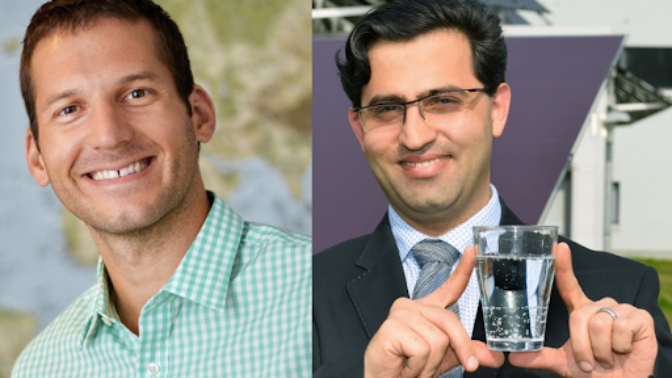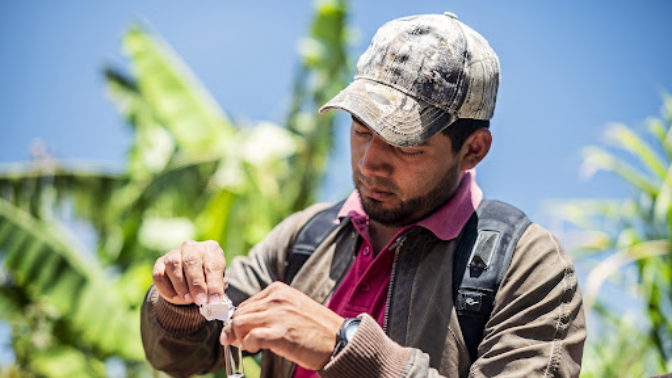Why Mentorship Matters and How Being a Mentor Can Benefit Your Career
epMentoring program mentor Dr. Hamed Beheshti and his mentee, Wesley Meier, share how they’ve grown from working together.

On the surface, mentorship can seem like a one-sided exchange where seasoned business leaders share their hard-earned knowledge and experience to industry newcomers who only have gratitude to offer in return. In reality, it’s an equal exchange, with mentors getting just as much from their mentees as they give.
Take Dr. Hamed Beheshti and his mentee, Wesley Meier. The two are part of the epMentoring program, implemented in partnership with the empowering people. Network (epN), an initiative of Siemens Stiftung, which empowers entrepreneurs to grow their businesses and social impact through one-on-one mentorship sessions with seasoned founders and tech professionals. Dr. Beheshti is using his hard-earned experience growing off-grid water companies in East Africa to help Wes scale up his own company in Central America. But even though Wes is the mentee, he’s also teaching Dr. Beheshti a thing or two about their industry.
“I have never worked with water pipelines, but Wes has and I am learning from him,” Dr. Beheshti said. “I share my knowledge of scaling up a company and Wes teaches me how pipelines and tap water work in off-grid communities.”
enpact recently spoke with Dr. Beheshti and Wes about their experience so far in the epMentoring program, the benefits of being a mentor and how to make the most out of the mentor-mentee relationship.
Could you please introduce yourselves and tell us a bit about the work you’re doing?
Wesley Meier: My background is in mechanical engineering and I started EOS in 2008. I was a Peace Corps volunteer in rural Nicaragua helping farmers improve their livelihoods. I lived in a rural community for two years and learned both about the needs of these communities and the resources they had available. The idea for EOS International was formed on horseback rides to these communities, along with my affinity for technology. Our organization started with sourcing ovens, stoves, solar panel systems, water treatment systems and drip irrigation technology. We eventually realized that we were handling multiple supply chains and running multiple business units and decided to focus on water and water treatment as that was where we could make the most impact.
Today, EOS works in rural communities and provides water treatment solutions, mostly in the form of chlorination. The water we work with is piped in but comes from open sources that are contaminated 90% of the time. We go in and add treatment in the form of chlorination and provide other products and services. We’re currently working in just over 1,500 rural communities in Honduras and Nicaragua and serve over 600,000 people.
Dr. Hamed Beheshti: I am known as the “water man” in East Africa because of my water supply business. When I say East Africa, I mean the eastern side of the continent from Somalia down to South Africa. One part of the business is Boreal Light, which manufactures solar water desalination systems here in Berlin, and the other is our service arm, WaterKiosk, which delivers water to people and is more widely known.
In our B2C business model we use the machines Boreal Light manufactures and sell the water commercially at one-fourth of the typical cost in East Africa. We also operate a social enterprise that offers water at one-fortieth of the cost. We don’t just offer drinking water but also water for irrigation, fish farms and sanitation, which is the package we offer specifically to village communities.

Why did you decide to join the epMentoring program?
Dr. Hamed Beheshti: People already contact me and ask questions about their businesses, and even large corporations have reached out to me for advice, including two of the largest water companies in Asia. But when it comes to epMentoring, this is a program that is offering founders benefits I never had access to when I started out.
When I established my company six years ago, there weren’t any water-related programs or mentorship opportunities out there. I always had to fit myself into the renewable energy sector, which wasn’t the best fit. It took a lot of trial and error to get to where I am today, and I can offer this experience to young entrepreneurs and help them avoid making the same mistakes as I did.
Wesley Meier: I learned about the program through Siemens Stiftung (foundation) and the empowering people. Network. I realize the value of working with experts and have had — and still have — mentors. I want to learn quicker and fail quicker, and working with mentors gives you access to new ideas and pushes you to think differently about things, whether it’s technology or how to approach marketing or scaling.
There’s a nice overlap between myself and Hamed. While EOS is not in East Africa and the technology we use may be different, we both work in water and are members of some of the same alliances, networks and groups. Learning from Hamed has been really neat, and I see a lot of value in working with mentors for that exact reason, because you learn from their experience and challenges.
Has your work together led to any changes in your business?
Wesley Meier: Hamed has really been helping me think through scaling, and scaling in a much bigger way than I had previously thought of. He thinks big and has big projects going on, and that’s been very helpful for me to think about that next level and what it would look like. We’re looking to scale our reach and even our product line, and that’s something Hamed has helped facilitate.
Dr. Beheshti: Before meeting Wes, I had never met anyone working in the off-grid water industry with water distribution via pipe and have had many discussions with him about this. I am part of a group establishing the “Off-Grid Water Alliance” and I invited Wes to be a founding partner as he represents a solution that is not well-known in Africa. I believe the Off-Grid Water Alliance will benefit from Wes’ experience and what he has done in another part of the world.
How was your first meeting with Dr. Beheshti, and do you have any advice on how to make the first meeting with your mentor a success?
Wesley Meier: If you asked me, “Tell me about your business,” I’m going to tell you all of the highlights and keep out a lot of other stuff. But when talking to your mentor, you need to really dig into your business and focus on your needs and problems. That initial conversation is crucial because it’s an opportunity to share specific challenges and struggles and establish trust.
It’s important to continue and build upon that trust, too, because I can gain more by being real about my challenges and saying, “Hey, this is where we’re at and here are the needs we have.” The more vulnerable that you can be the more you can learn and glean and understand. This trust is hard to gain over a video call, but remote mentorship also presents an opportunity to work with mentors from around the world.
How has mentoring benefited your career, and do you have advice for mentors on how they can make the most out of an experience like this and benefit from it?
Dr. Beheshti: Mentorship is not someone who knows everything telling others what to do. It’s about sharing experience, whether that’s the experience of working with a specific type of technology, in a certain sector or in an area of the world. It’s about knowing a bit more about a certain part of the business or industry and sharing that knowledge. That means mentors can also learn from their mentees.
I have never worked with water pipelines but Wes has and I am learning from him. I share my knowledge of scaling up a company and Wes teaches me how pipelines and tap water work in off-grid communities. Mentorship is just sharing experience, and the knowledge a mentor receives from their mentee is of no lesser value than what the mentee gains from their mentor.
As someone who has worked with mentors before, what is your advice for how founders can get the most out of this relationship?
Wesley Meier: Finding ways to establish trust is incredibly important, and you can accomplish that by being open and honest. It’s also important to do some self-reflection on your company’s needs. Mentees should look for overlap with their mentor’s skills and experience and their own.
It’s on the mentee to do the research so that they can ask questions related to their mentor’s work and experience and not just say, “Hey, tell me what you know,” because that’s not going to go anywhere. It’s about finding the overlaps and asking specific questions about why your mentor did what they did.
What has been the biggest highlight of the epMentoring program so far for each of you?
Wesley Meier: Meeting somebody new and having access to a whole new network has been really awesome. Hamed has a ton of connections, and being able to work with such a high-profile person in our industry has been incredible.
Dr. Beheshti: It’s always great to meet people like Wes who are in the off-grid water sector with a proven business model and technology who are also confident in what they’re doing. Many entrepreneurs are not confident, but from the very first time I spoke with Wes I could see how confident he is in the path he’s chosen. That’s the greatest highlight for me, to meet a person in this industry with such great confidence in what they aim to do.
Learning about how he got into the industry, not just sitting in a fancy office in the U.S. but being in the field, I really value that in a person because I travel with my family for work to some of the remotest villages in Africa. I would say it’s not just a highlight of this program but one of my career highlights to know Wes and I’m sure that we can do a lot together, not just as mentor and mentee but as colleagues.
*This article was originally published on enpact’s website and authored by Michael Hines.